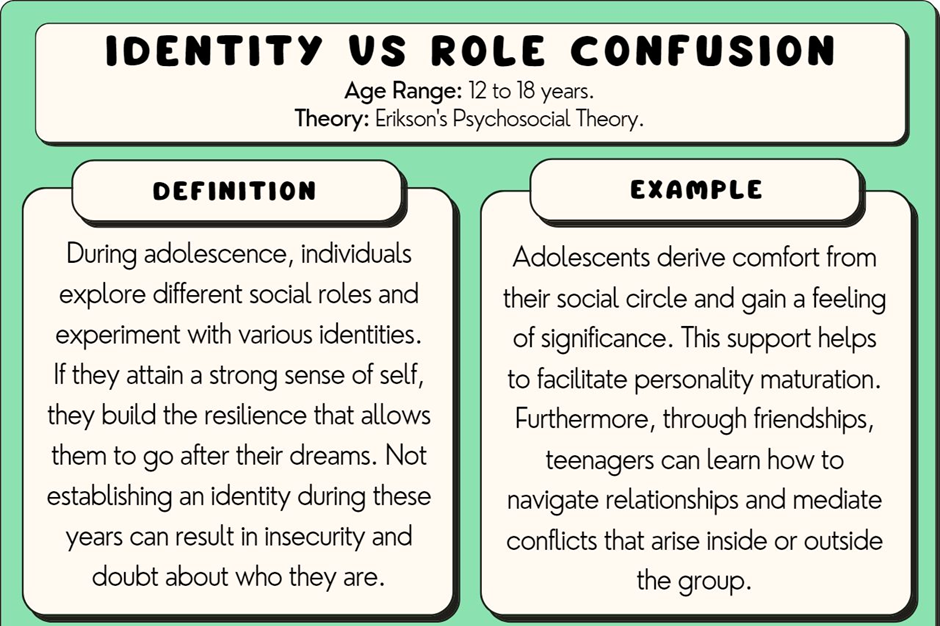Which statement suggests a struggle with Erikson's phase of Identity vs. role confusion? Select one:
“I’m so sad and I feel I haven't accomplished much in my life.”
“I’m so anxious, can't seem to trust anyone."
"I'm so tired after work that I just want to watch TV and be alone.”
"I'm so confused about what my goals are.”
The Correct Answer is D
Choice A Reason:
"I’m so sad and I feel I haven't accomplished much in my life." This statement may relate more to feelings of despair and a sense of unfulfilled purpose, which could be associated with Erikson's stage of Integrity vs. Despair (late adulthood).
Choice B Reason:
"I’m so anxious, can't seem to trust anyone. “This statement may indicate difficulties with trust and may be more aligned with Erikson's stage of Trust vs. Mistrust (infancy).
Choice C Reason:
"I'm so tired after work that I just want to watch TV and be alone. “This statement may reflect fatigue or a desire for solitude and may not directly represent the identity development struggles associated with Erikson's Identity vs. Role Confusion stage.
Choice D Reason:
"I'm so confused about what my goals are.” Erikson's phase of Identity vs. Role Confusion occurs during adolescence, and individuals in this stage are exploring and forming their own identity. The statement "I'm so confused about what my goals are" suggests a struggle with establishing a clear sense of identity and future direction, which is characteristic of the challenges faced during this developmental stage.

Nursing Test Bank
Naxlex Comprehensive Predictor Exams
Related Questions
Correct Answer is ["B","C","D","E"]
Explanation
Choice A Reason:
The coping skills (Choice A) may be observed and assessed as part of the broader clinical picture, but they are not typically specific components of a formal Mental Status Examination.
Choice B Reason:
Ability to perform calculations. This assesses the client's cognitive abilities, specifically related to mathematical reasoning and problem-solving.
Choice C Reason:
Recall ability. Assessing recall ability helps evaluate the client's short-term memory, which can be impaired in individuals with dementia.
Choice D Reason:
Long-term memory. Evaluating long-term memory provides insights into the client's ability to recall information from the distant past, which is another aspect of cognitive function.
Choice E Reason:
Level of orientation. Assessing orientation to time, place, and person is crucial in understanding the client's awareness of their surroundings and current circumstances, which can be affected in dementia.
Correct Answer is B
Explanation
Choice A Reason:
Coordinating the implementation of the nursing care plan and documents is inappropriate. This choice is more related to general nursing responsibilities and care coordination. Milieu therapy specifically focuses on creating a therapeutic environment rather than coordinating care plans and documents.
Choice B Reason:
Providing and maintaining a safe and therapeutic environment in collaboration with others is appropriate. Milieu therapy involves creating a therapeutic environment that promotes the patient's mental health and well-being. This includes ensuring safety, providing structure, and creating a supportive atmosphere for patients. The nurse, in collaboration with the healthcare team, is responsible for establishing and maintaining this therapeutic milieu.
Choice C Reason:
Applying current knowledge to assess the patient's response to medication is inappropriate.
Assessing the patient's response to medication is an important nursing responsibility, but it is not the primary focus of milieu therapy. Milieu therapy is more concerned with the overall environment and its impact on the patient's mental health.
Choice D Reason:
Giving anticipatory guidance to prevent or reduce mental illness and enhance mental health is inappropriate. While anticipatory guidance is important in nursing care, it may not capture the essence of creating and maintaining a therapeutic environment, which is the core of milieu therapy. This choice is more related to health education and preventive measures rather than the overall therapeutic environment.
Whether you are a student looking to ace your exams or a practicing nurse seeking to enhance your expertise , our nursing education contents will empower you with the confidence and competence to make a difference in the lives of patients and become a respected leader in the healthcare field.
Visit Naxlex, invest in your future and unlock endless possibilities with our unparalleled nursing education contents today
Report Wrong Answer on the Current Question
Do you disagree with the answer? If yes, what is your expected answer? Explain.
Kindly be descriptive with the issue you are facing.
